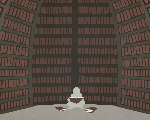You’re Sadly Mistaken If You Think Libraries Are Just For Storing Books
“If a library is just where a society keeps its books, then it’s easy to see why many people no longer perceive libraries as relevant. In the days of yore, a building full of books was a clear metaphor for collective knowledge. But today, knowledge is no longer bound to the printed page, and electronic and non-textual forms of media proliferate. Our cultural knowledge is no longer represented primarily as text within books. Moreover, with the internet, we can access our multimedia cultural knowledge from virtually anywhere.”
Czeslaw Milosz: Poetry As Sunlight
Unlike many great twentieth-century writers, who saw truth in despair, Milosz’s experiences convinced him that poetry must not darken the world but illuminate it: “Poems should be written rarely and reluctantly, / under unbearable duress and only with the hope / that good spirits, not evil ones, choose us for their instrument.”
What Shakespeare Can Teach Us About Language And Cognition
“A cognitive scientist looking at [scholar Stephen] Booth’s explanation of Shakespearean effects would spot many concepts from her own discipline. Those include priming – when, after hearing a word, we tend more readily to recognize words that are related to it; expectation – the influence of higher-level reasoning on word recognition; and depth of processing – how varying levels of attention affect the extent of our engagement with a statement. (Shallow processing explains our predisposition to miss the problem of whether a man should be allowed to marry his widow’s sister.)”
Unknown Sylvia Plath Poems Discovered In Old Carbon Paper
Talk about unlikely places! “Written at the start of Plath and [Ted] Hughes’s relationship in autumn 1956, the two unseen poems were deciphered from a carbon paper on which Plath had also typed up a table of contents for Hughes’s groundbreaking collection The Hawk in the Rain.”




No comments:
Post a Comment